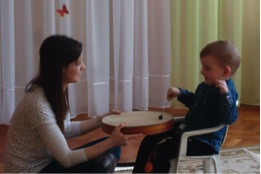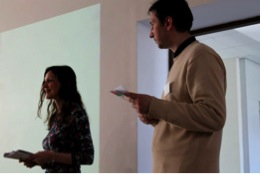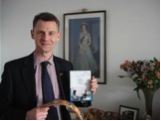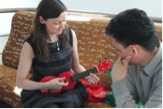Reaching Moldova through music
Our music therapy lecturer Sarah Hodkinson is lead music therapy clinician of a strategy team that has been working in Moldova for several years. Here she tells us about some recent exciting developments : The team, comprising of Deborah Green (speech and language therapist), Alice Baxter (music therapy student) and Jane Ebel (project director) as well as myself as music therapy clinician, have been working with local Moldovan partners to introduce music therapy for children with disabilities in Baby Homes and centres. This work supports the deinstitutionalisation of a regime of orphaning children with disabilities, and focuses on training and equipping professionals and parents to care for these children in environments where they can thrive, such as homes and schools.
: The team, comprising of Deborah Green (speech and language therapist), Alice Baxter (music therapy student) and Jane Ebel (project director) as well as myself as music therapy clinician, have been working with local Moldovan partners to introduce music therapy for children with disabilities in Baby Homes and centres. This work supports the deinstitutionalisation of a regime of orphaning children with disabilities, and focuses on training and equipping professionals and parents to care for these children in environments where they can thrive, such as homes and schools.
 Music therapy has the potential to play a key role in this transformation. Over the last five years, we have developed a bespoke technique named ‘Communication Through Music’ or ‘Com-musicating’. This draws on key principles from music therapy and speech and language therapy. It allows children with complex disabilities to use music as a means of developing fundamental, early communication skills, giving them a voice and means of interaction that in many cases has not existed previously. Learning ‘Communication Through Music’ techniques enables practitioners to support children in meeting key developmental milestones.
Music therapy has the potential to play a key role in this transformation. Over the last five years, we have developed a bespoke technique named ‘Communication Through Music’ or ‘Com-musicating’. This draws on key principles from music therapy and speech and language therapy. It allows children with complex disabilities to use music as a means of developing fundamental, early communication skills, giving them a voice and means of interaction that in many cases has not existed previously. Learning ‘Communication Through Music’ techniques enables practitioners to support children in meeting key developmental milestones.
 We have produced a training DVD featuring music therapy sessions filmed in Moldova. British Ambassador Phil Watson hosted a launch and reception at his residence on Thursday 9th April, announcing the significance of this programme for vulnerable children and the excitement as this approach is internationalised.
We have produced a training DVD featuring music therapy sessions filmed in Moldova. British Ambassador Phil Watson hosted a launch and reception at his residence on Thursday 9th April, announcing the significance of this programme for vulnerable children and the excitement as this approach is internationalised.
 Last week the Communication Through Music DVD was used for the first time, as thirty professionals came together in Moldova’s capital Chisinau to receive specialist training. These professionals returned to their centres and began working with children immediately. When asked why this might be of value a centre director responded, ‘because it works and we need it and because it doesn’t exist here. I have seen it working over the past 3-4 years. For many severely disabled children we don’t have an answer and then we find out that music is the answer for some children. So now it needs to be widespread, reaching the smallest, poorest, most rural kindergartens’.
Last week the Communication Through Music DVD was used for the first time, as thirty professionals came together in Moldova’s capital Chisinau to receive specialist training. These professionals returned to their centres and began working with children immediately. When asked why this might be of value a centre director responded, ‘because it works and we need it and because it doesn’t exist here. I have seen it working over the past 3-4 years. For many severely disabled children we don’t have an answer and then we find out that music is the answer for some children. So now it needs to be widespread, reaching the smallest, poorest, most rural kindergartens’.

